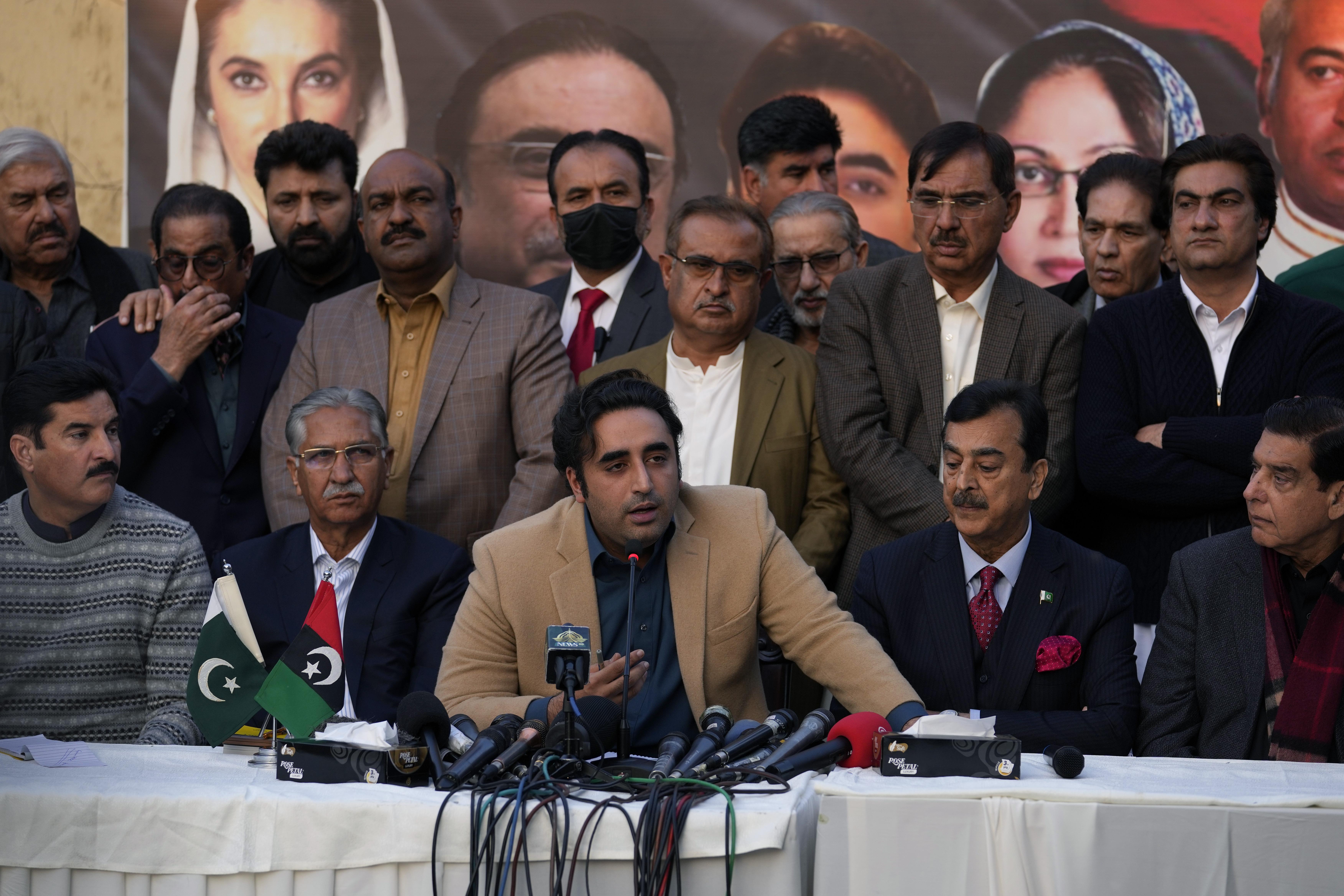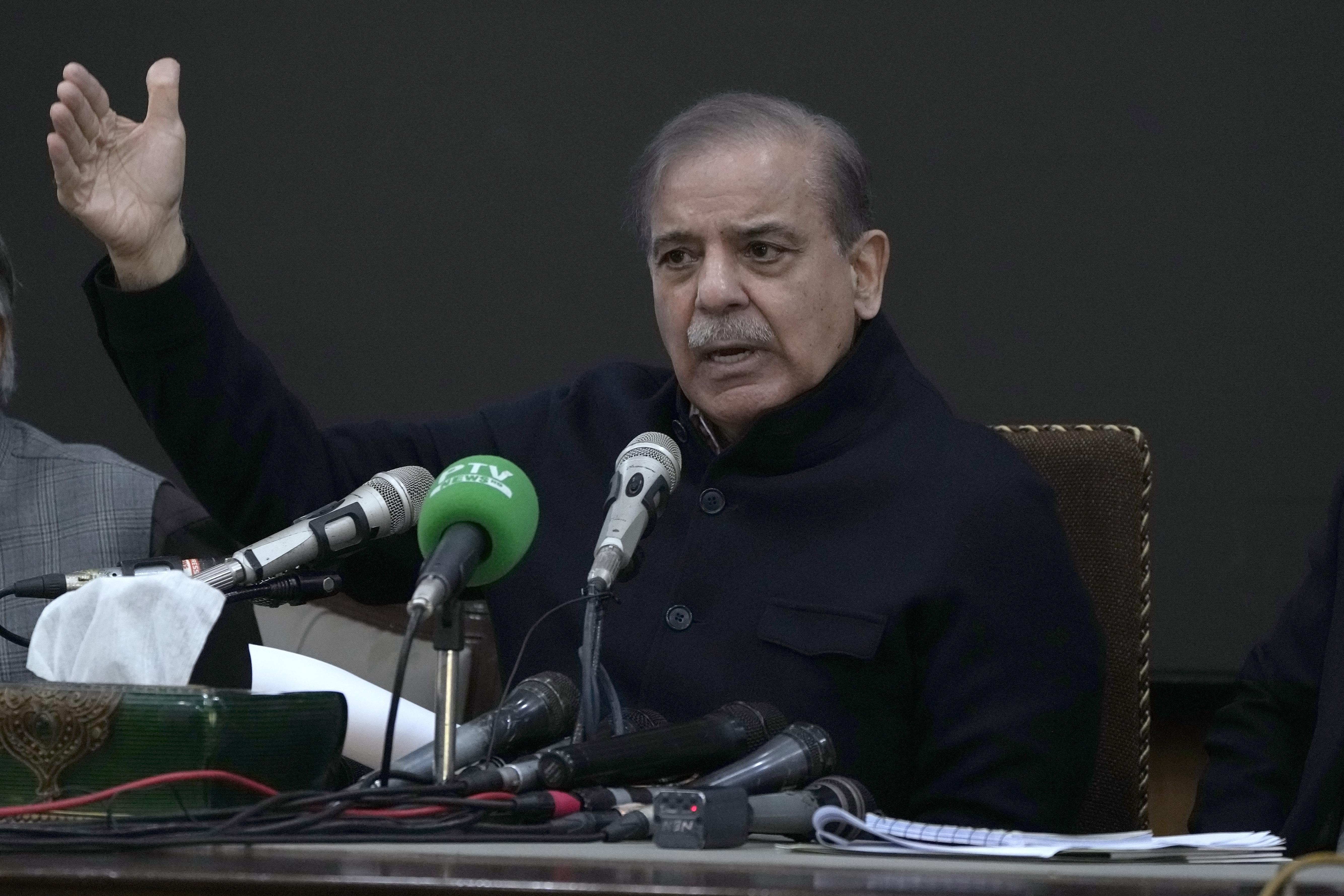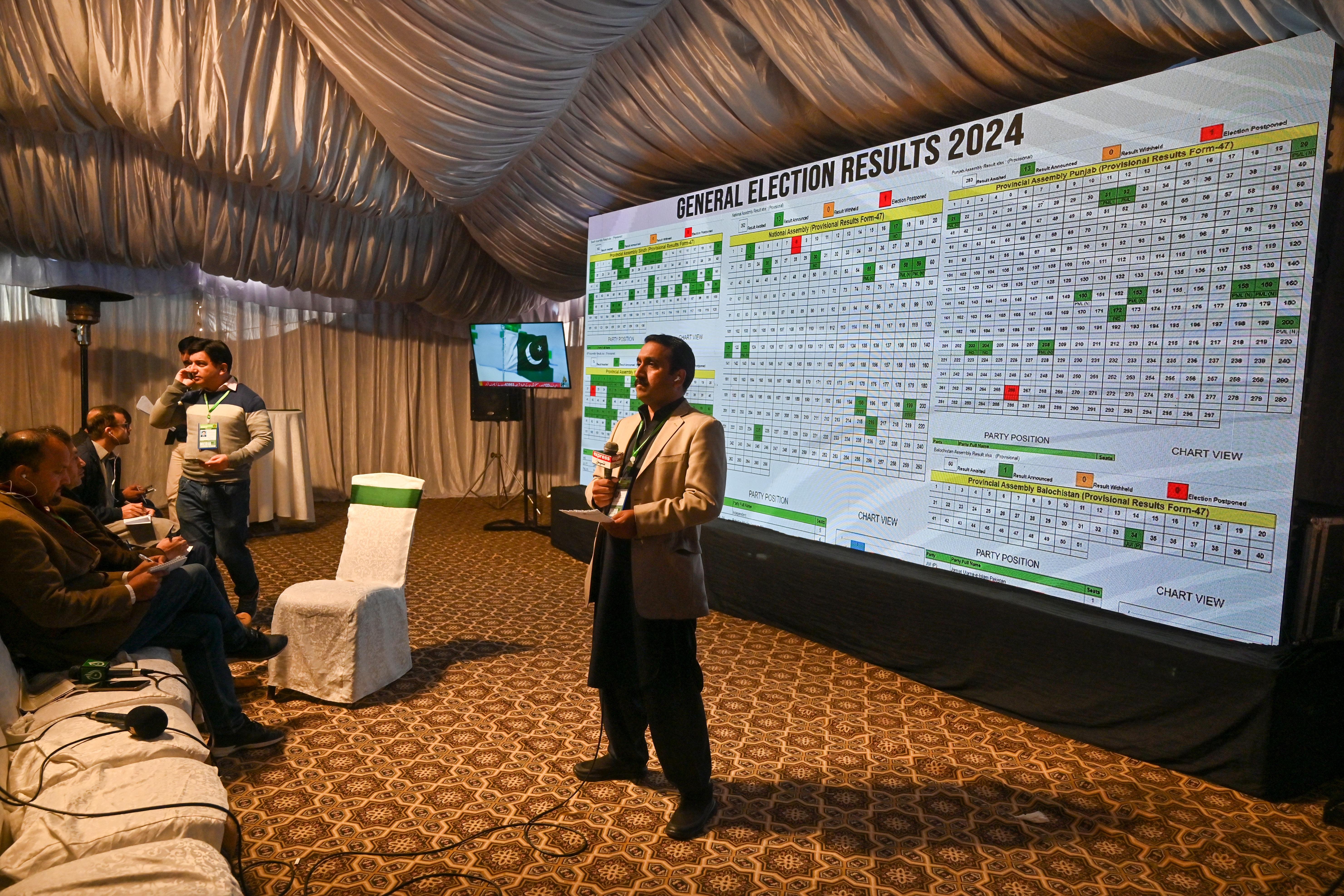 Bilawal-Bhutto Zardari (center bottom), chairman of Pakistan People's Party, speaks as party aids watch during a press conference regarding parliamentary elections, in Islamabad, Pakistan, Feb 13, 2024. (PHOTO / AP)
Bilawal-Bhutto Zardari (center bottom), chairman of Pakistan People's Party, speaks as party aids watch during a press conference regarding parliamentary elections, in Islamabad, Pakistan, Feb 13, 2024. (PHOTO / AP)
Pakistan’s uncertainty for the next government continues with major parties and election-winning independent candidates negotiating with different camps. Both Pakistan Muslim League-Nawaz (PML-N) and Pakistan Tehreek-e-Insaf (PTI) have made announcement of their intentions to form a coalition government at the federal level days after the country’s tensely contested polls.
The PML-N came in collaboration with a diverse array of coalition partners, including the Pakistan Peoples Party Parliamentarians (PPPP), an electoral extension of the PPP, Muttahida Qaumi Movement (MQM), Jamiat Ulema-e-Islam (JUI).
The founder of PTI and former prime minister Imran Khan, meanwhile, on Tuesday revealed that the former ruling party was willing to talk to all political parties except for the PPP, PML-N and MQM. PTI is also seeking a coalition government of its own side.
READ MORE: Pakistan election: Independents lead in final results tally
A press release by the Pakistan Peoples Party said on Wednesday that a consultative meeting was held between the committees of the PPP and the PML-N. Proposals were discussed regarding inflation, unemployment and relief from poverty in the country.
 Pakistan's former prime minister Shahbaz Sharif speaks during a press conference regarding parliamentary elections, in Lahore, Pakistan, Feb 13, 2024. (PHOTO / AP)
Pakistan's former prime minister Shahbaz Sharif speaks during a press conference regarding parliamentary elections, in Lahore, Pakistan, Feb 13, 2024. (PHOTO / AP)
The current tally indicates that the PML-N and PPP coalition parties are on track to secure the minimum required number of 169 seats to form the government at the federal level
“It was agreed that there is a need for a stable democratic government to deal with the challenges of economy, politics, law and order and terrorism,” said the PPP release.
In a press conference attended by key political figures on the day, including Sadiq Sanjrani of the Balochistan Awami Party, former president Asif Ali Zardari representing PPPP, and Maqbool Siddiqui of MQM, Shahbaz Sharif, the former prime minister and President of PML-N, unveiled the coalition's plans.
Shahbaz Sharif, flanked by his coalition partners, disclosed that he had been nominated for the position of Prime Minister by his brother, former prime minister Nawaz Sharif.
READ MORE: 51 terrorist attacks occur in Pakistan to disrupt electoral process
Meanwhile, Maryam Nawaz Sharif, the daughter of Nawaz Sharif, has been put forward as the Chief Ministerial candidate for Punjab, potentially becoming the first woman to hold this position in the province's history.
For PML-N, despite initial speculation that Nawaz Sharif would reclaim the premiership, it was ultimately revealed that Shehbaz had received his brother's endorsement for the position.
The coalition's combined tally of general seats stands at 152, providing the foundation for government formation. However, the ultimate goal of achieving a two-thirds majority in the National Assembly remains uncertain, pending decisions from independent candidates and the allocation of reserved seats for women and minorities.
PTI Chairman Barrister Gohar Ali Khan said on Tuesday that his party had won 180 seats across the country, and the name of the party’s prime ministerial candidate would be announced
The current tally indicates that the PML-N and PPP coalition parties are on track to secure the minimum required number of 169 seats to form the government at the federal level. This calculation includes the addition of 60 women and 10 minority seats to their total count. However, the attainment of the next milestone, the two-thirds majority of 224 seats in the 336-member National Assembly, remains uncertain.
ALSO READ: President: China-Pakistan ties stabilizer in changing world
The outcome hinges on the decisions of independent candidates, with 101 emerging victorious in the Feb 8 elections, including 92 supported by the PTI. These independents hold the key to the allocation of reserved seats, as they must choose whether to align with a political party or maintain their independent status.
PTI Chairman Barrister Gohar Ali Khan said on Tuesday that his party had won 180 seats across the country, and the name of the party’s prime ministerial candidate would be announced.
 Journalists stand in front of a screen showing live results in the Election Commission office in Islamabad on Feb 9, 2024, a day after Pakistan's national elections. (PHOTO / AFP)
Journalists stand in front of a screen showing live results in the Election Commission office in Islamabad on Feb 9, 2024, a day after Pakistan's national elections. (PHOTO / AFP)
During a conversation with the media, after meeting with the party’s founding chairman and former premier Imran Khan in Adiala Jail, along with other PTI leaders, he mentioned that they had secured all three NA seats in Islamabad and an additional four seats in Balochistan, according to The News International.
Likewise, he explained that they had won a total of 115 NA seats in Punjab, 16 in Sindh, and 42 in Khyber Pakhtunkhwa, resulting in the party obtaining 180 seats nationwide.
ALSO READ: Parties, candidates finish campaign for Pakistan's elections
According to the stipulations outlined in Article 51(3) of the Constitution, Punjab, Sindh, and Balochistan provinces each have reserved seats for women, totaling 32, 14, and 4 respectively. The distribution of these seats among the parties will be based on the general seats won by each party in their respective provinces.
In contrast, the allocation of the 10 minority seats will be determined by the total number of general seats secured by each party nationwide. This method reflects the national constituency status accorded to minorities across the country.
Kaswar Klasra is a freelance journalist for China Daily.
Vivien Xu in Hong Kong contributed to the story.


